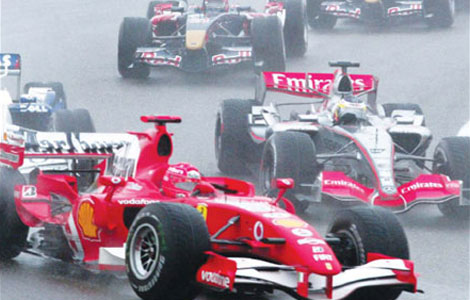Foreign and Military Affairs
Leaders call for peace and prosperity
Updated: 2011-04-15 07:15
By Wu Jiao and Li Xing (China Daily)
SANYA, Hainan - The leaders of the world's top emerging economies pledged on Thursday to work for peace and prosperity as they met amid a turbulent background defined by Middle East turmoil and slow global economic recovery.
|
![Leaders of the fi ve BRICS nations attend a news conference in Sanya, Hainan province, on Thursday. The leaders, (from left) India's Prime Minister Manmohan Singh, Russia's President Dmitry Medvedev, President Hu Jintao, Brazil's President Dilma Rousseff and South Africa's President Jacob Zuma, agreed at the summit to seek reform of the international monetary system.[Wu Zhiyi / China Daily] Leaders call for peace and prosperity](../../images/attachement/jpg/site1/20110415/002170196e1c0f11bfe215.jpg) Leaders of the five BRICS nations attend a news conference in Sanya, Hainan province, on Thursday. The leaders, (from left) India's Prime Minister Manmohan Singh, Russia's President Dmitry Medvedev, President Hu Jintao, Brazil's President Dilma Rousseff and South Africa's President Jacob Zuma, agreed at the summit to seek reform of the international monetary system. [Wu Zhiyi / China Daily] |
President Hu Jintao, who hosted the 3rd summit of the BRICS (Brazil, Russia, India, China and South Africa) in the resort city of Sanya, Hainan province, said erupting hotspots were affecting international stability.
The economic imbalance between the North and South remains prominent and the root causes of the global financial crisis have not been resolved, Hu said.
"We share the principle that the use of force should be avoided," the five leaders said in their joint Sanya Declaration, while expressing serious concern over turbulence in the Middle East, especially in Libya.
Four of the five BRICS countries abstained from a UN Security Council resolution establishing a no-fly zone over Libya and authorizing "all necessary measures" to protect civilians, thus opening the door to coalition airstrikes. South Africa was the only BRICS nation to approve the resolution, but it became the leading force mediating for a cease-fire in Libya.
"Like the other BRICS nations, Russia is deeply concerned by events in Libya and civilian deaths there," Russian President Dmitry Medvedev was quoted as saying by Russian media after the summit. "Our shared opinion is that the problem should be resolved by political and diplomatic efforts, not through the use of force."
"We wish to continue our cooperation in the UN Security Council on Libya," the declaration said, pledging their support for the African Union's mediating initiative to end hostilities in Libya.
Together with Hu and Medvedev, Brazil's Dilma Rousseff, Indian Prime Minister Manmohan Singh and South Africa's Jacob Zuma gathered for the talks on Thursday.
They discussed a range of issues and were committed to "multilateral diplomacy with the United Nations playing the central role in dealing with global challenges and threats", according to the declaration.
"We stand for a rule-based, stable and predictable global order," Singh was quoted as saying during the plenary session by the Indian media. "We respect each other's political systems and stages of development.
"Our priority is the rapid socio-economic transformation of our people and those of the developing world. Our cooperation is neither directed against, nor at the expense of, anyone," Singh added.
However, the leaders highlighted the "excessive volatility in commodity prices, particularly those for food and energy", which they believed are stumbling blocks to the world economy emerging from its crisis.
Among a series of proposals to help boost global economic recovery, the declaration stressed the importance of pushing for sustainable growth and developing renewable energy, "as a means to address climate change".
The leaders also "shared our expectations" for the United Nations climate change conference to be held in Durban in December. "South Africa wants to ensure a legally-binding climate change agreement that will govern the world's response to increasingly visible effects of climate change," Zuma said.
While expressing their condolences for the triple disasters that Japan suffered, the leaders shared their belief in the declaration that "nuclear energy will continue to be an important element in the future energy mix of BRICS countries", calling for continuing international cooperation in developing safe nuclear energy for peaceful purposes.
The bloc now represents more than 40 percent of the world's population, and their combined GDP accounted for 18 percent of the global total in 2010, according to the International Monetary Fund.
The leaders also unveiled plans to expand collaboration in public health, regional cooperation, green economic development and to promote scientific and technological development and innovation.
Senior officials from the five countries will discuss ways to establish a working group for collaboration in the pharmaceutical industry.
"We want joint efforts to promote our economic, commercial, scientific and technological relations as well as educational and cultural relations," Rousseff said at the news conference after the summit.
While some countries view the bloc as opposed to developed countries in certain sectors, the declaration said that the BRICS serve as a platform for dialogue and cooperation, and reflect the principles of openness, solidarity and mutual assistance.
"We reiterate that such cooperation is inclusive and non-confrontational," the declaration said.
The five countries all serve as members of the UN Security Council, with China and Russia being two of the five permanent members.
China and Russia reiterated the importance they attach to India, Brazil and South Africa in international affairs, and understand and support their aspirations to play a greater role in the UN, the declaration said.
Shi Yinhong, a researcher on international politics with Beijing-based Renmin University of China, said the BRICS stance on the chaos in Africa and the Middle East is significant and marks a departure for the bloc that used to devote its attention to economic matters.
"It's the beginning of political cooperation," Shi said.
Fu Xiaoqiang, a scholar on South Asia studies at the China Institutes of Contemporary International Relations, said it is natural for the BRICS, all prominent regional powers, to voice their political and economic opinions.
"With growing differences with the West, for example, in regard to the handling of Libya, it's normal for the member countries to exchange their views on political matters more and more," Fu said.
On differences within the group, Fu said they were not significant enough to hinder cooperation on global issues.
Li Xiaokun and Ai Yang contributed to this story.
E-paper

Green light
F1 sponsors expect lucrative returns from Shanghai pit stop
Preview of the coming issue
Toy for rich boys
Reaching out
Specials

Share your China stories!
Foreign readers are invited to share your China stories.

No more Mr. Bad Guy
Italian actor plans to smash ‘foreign devil’ myth and become the first white kungfu star made in China.

Art auctions
China accounted for 33% of global fine art sales.





